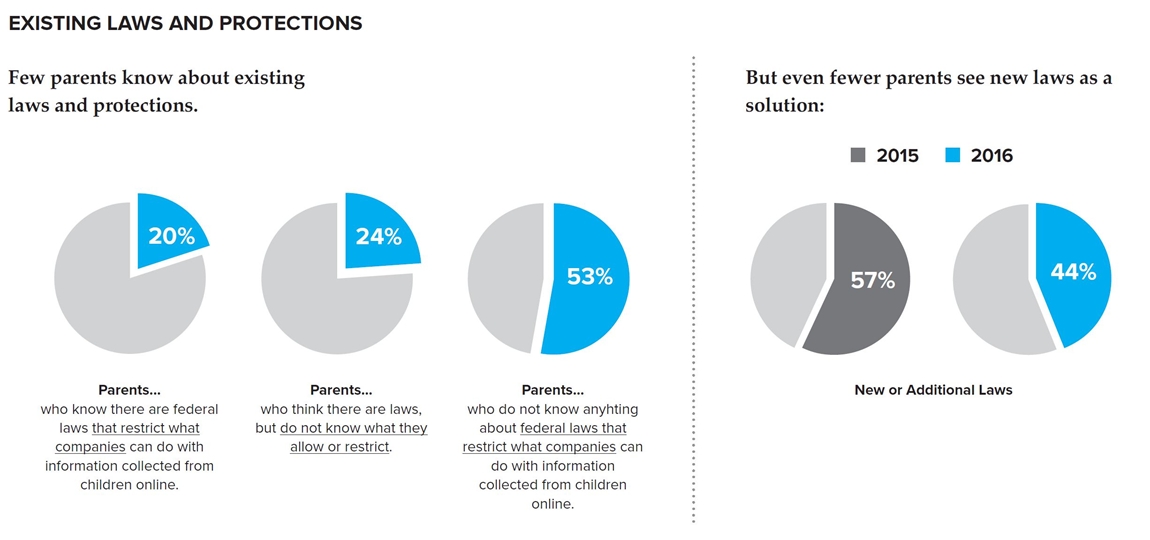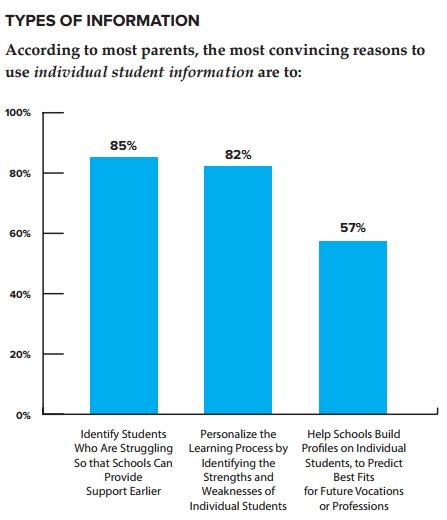Report: Parents Mostly Clueless About Student Data Privacy Laws
- By Dian Schaffhauser
- 12/19/16
In 2015, the Future of Privacy Forum undertook a survey to understand directly from parents how they viewed the use of technology in their children's schools and the application of data generated through that usage. At that time, 87 percent of parents expressed concern about the privacy and security of student data in schools and 71 percent said they were "comfortable" with the use of a "properly protected electronic education record" being created for their child.
This year, FPF repeated the survey process with a few tweaks. The focus in the latest survey was on whether or not parents' understanding of laws and rules guiding the use of student data has grown and whether their concerns have changed. Among the 646 respondents who had children in grades K–12 of public schools who took the survey online in 2016, those numbers have held steady.

Source: Future of Privacy Forum's "Beyond One Classroom: Parental Support for Technology and Data Use in Schools" report.
According to "Beyond One Classroom: Parental Support for Technology and Data Use in Schools," more than seven in 10 parents (71 percent) said they were comfortable with a properly protected electronic education record being created for their children. Nearly eight in 10 (77 percent) said they believe that this kind of record would be a valuable tool for improving their children's educational opportunities. A comparable number would be more likely to support collecting and using data in an electronic record if they knew a school and/or educational service provider were required to ensure security (82 percent) and use of the record only for education purposes (84 percent).
Nearly every parent (94 percent) said they should be informed when their child's record was being shared so they'd know with whom it was being shared and why.

Source: Future of Privacy Forum's "Beyond One Classroom: Parental Support for Technology and Data Use in Schools" report.
Respondents had specific opinions regarding that "who" question. At the top of the list for sharing of data were principals (designated by 92 percent of parents) and teachers (selected by 91 percent). The majority of parents also approved of the use of their student's data by the state departments of education (80 percent) and the United States Department of Education (75 percent). Parents were less comfortable giving access to the federal government, in general (51 percent), other school districts (46 percent), ed tech companies (43 percent) and nonprofit organizations (31 percent).
One substantial change from last year to this year was approving of the use of data on race or ethnicity, which rose from 39 percent last year to 53 percent this year. Another big area of change was tied to parent use of technology in schools, such as for checking grades or looking at assignments. That grew from 58 percent in 2015 to 78 percent in 2016. The number of parents who reported that their child used tech provided by the school also rose, from 71 percent to 90 percent.
In the area of laws regulating the use of student data, parents are still mostly clueless, and they don't buy into the idea that more laws will somehow provide the answers they want. Only one in five parents knew that there were federal laws restricting what companies can do with information collected from children online. Another 24 percent knew there were laws but didn't know the details. The remainder knew nothing about federal laws in particular. And this year, the number of parents who see new laws as the answer dropped from 57 percent last year to 44 percent.
The survey demonstrated a "strong baseline of knowledge and constructive communication between schools and parents," FPF concluded in its report. "The priorities continue relatively unchanged: to help schools select and implement appropriate technologies, train teachers and administrators, and communicate effectively with parents about the expanded use of technology throughout the educational process."
The report is available for download on the FPF website here.
About the Author
Dian Schaffhauser is a former senior contributing editor for 1105 Media's education publications THE Journal, Campus Technology and Spaces4Learning.